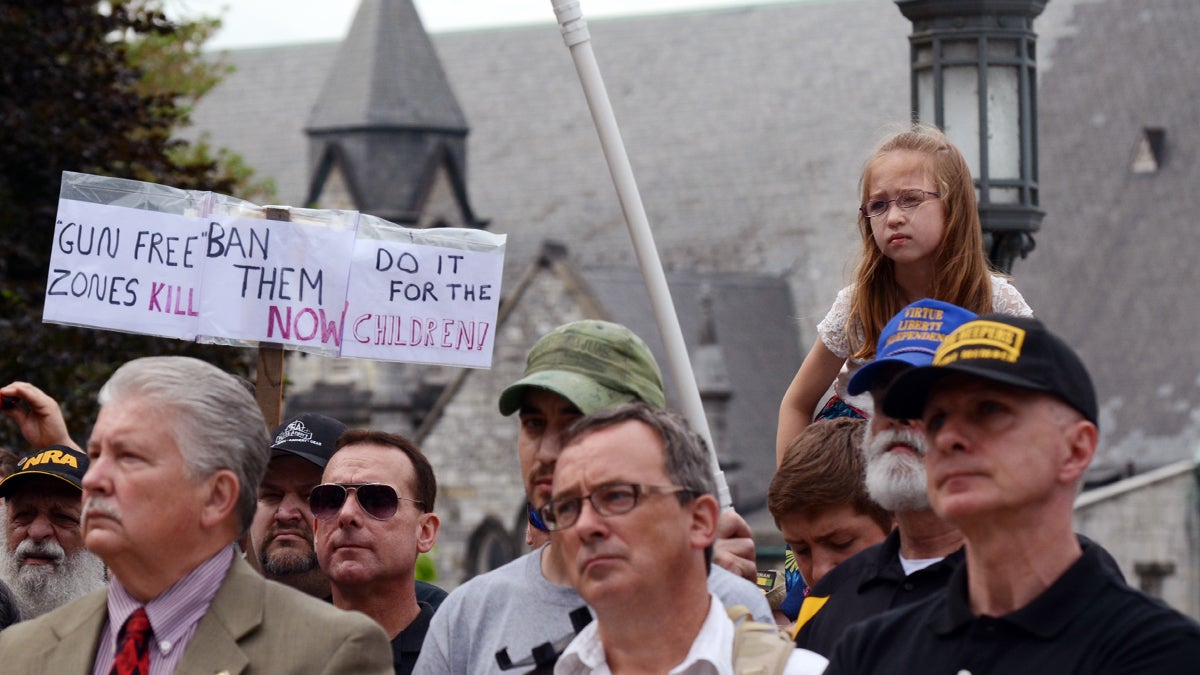Lower Merion will fight firearms ordinance ruling

In this file image
Most challenges to gun-control ordinances in recent years in Pennsylvania have been dismissed outright — generally, because the plaintiffs lacked standing after the courts overturned a state law known as Act 192.
Lower Merion Township’s effort to ban the use of guns in its parks is different, however, because one plaintiff in the suit challenging that ordinance resides in the township.
While Montgomery County Court ultimately upheld Lower Merion’s ordinance, an appeals court issued a 2-1 decision a couple weeks ago against the township.
Township officials now say they’ll appeal the most recent ruling. They couldn’t provide details on how much it has cost to defend the ordinance.
Plaintiffs’ expenses are $50,000 thus far. They’d have to win a federal lawsuit to get reimbursed, which their attorney Josh Prince said they will pursue at some point.
Special case?
Effective in 2015, Act 192 allowed anyone to challenge a municipal firearms law, on the taxpayer’s dime, regardless of whether they’d ever set foot in the community let alone been cited for violating the ordinance in question.
The state Supreme Court later overturned Act 192 because of the way the legislature enacted it.
About 100 municipalities had already repealed their gun ordinances; lawsuits were filed against a handful that didn’t. After the state Supreme Court decision, lower courts quickly dismissed cases against Pittsburgh, Philadelphia and Lancaster outright because the NRA had filed them without a resident plaintiff.
But the case against Lower Merion Township continued because plaintiff Joseph Abramson lives in the township. Abramson is named on the lawsuit along with Firearms Owners Against Crime President Kim Stolfer, who lives in South Fayette Township, 25 miles southwest of Pittsburgh.
Abramson hasn’t been cited for violating the ordinance. Township officials say they’ve never enforced it, even when several dozen others carried guns through Bala Cynwyd Park in protest a few days before the lawsuit was filed.
But the lawsuit argues the potential for harm is there, and that’s sufficient for at least one “prong” of the legal standard for the preliminary injunction being sought here.
Montgomery County Court ruled against the FOAC in August 2015, noting Abramson hadn’t been harmed by the ordinance or even cited under it.
Finer points
If the township did enforce its ordinance, violators would face a $600 fine. The law otherwise merely reinforces provisions of Pennsylvania’s Uniforms Firearms Act, the township contends in court filings.
It bans carrying and discharging firearms in parks without a “special permit”, which Lower Merion’s lawyer Richard Sokorai said refers to a concealed carry license.
But the ordinance also seems to ban openly carrying firearms, which doesn’t require a permit in Pennsylvania.
Sokorai acknowledged the open carry issue is one that opens the door to challenge the law, a vulnerability that lingers despite a 2011 review of the provision.
The ordinance doesn’t include boilerplate exceptions, such as firing in self defense, either.
Prince said he was surprised those exceptions weren’t there. Including them, according to Prince, wouldn’t have “saved” the ordinance, though. Those issues didn’t even come up in the most recent decision, mainly because the appeals court is charged with focusing on potential errors in the lower court’s reasoning.
“Only the General Assembly can regulate when it comes to firearms and ammunition,” Prince said. “And that makes perfect sense because otherwise we would have a patchwork of laws across the commonwealth to ensnare law-abiding citizens.”
This case is much the same as one he won against Erie over that city’s ban on guns in parks, Prince said.
Sokorai said he’s focusing on the question of local governments regulating activity on its own property, which hasn’t been considered in the context of gun possession before.
Dissenting Judge Dan Pellegrini supported the township’s position in his opinion.
“A local government can control, like every other property owner, what takes place on its property,” Pellegrini wrote.
But the other two judges felt the township seemed to be relying on its governmental powers (not on its rights as property owner) in enacting the ordinance because it provides for police to remove people from parks if they have guns.
Prince likened the prospect of municipalities restricting gun use on government property to restricting speech.
There’s also the question of whether the state Supreme Court would agree to hear the case. It declines more than 90 percent of the time, according to Administrative Office of Pennsylvania Courts’ Art Heinz.
Prince also has a case filed in 2015 still pending against the city of Harrisburg over its firearms ordinances. Harrisburg resident Joshua First is listed as a plaintiff in that lawsuit along with Stolfer and Howard Bullock of nearby Lower Paxton Township.
WHYY is your source for fact-based, in-depth journalism and information. As a nonprofit organization, we rely on financial support from readers like you. Please give today.



